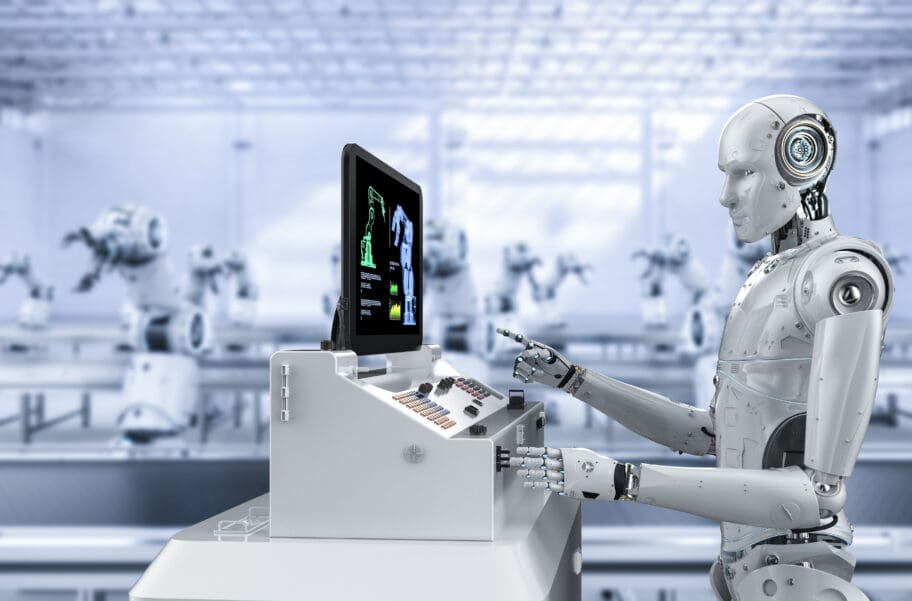Did you know that new technology such as automation in healthcare could improve efficiency and reduce medical errors, potentially saving the U.S. healthcare system an estimated $300 billion in costs? Yes, that's right! The rapid emergence and evolution of new technology, specifically business automation, are revolutionizing manual tasks in hospitals around the globe, aiming to improve efficiency and reduce medical errors through various applications. From appointment reminders to diagnosis, business automation and technology are taking over the manual process, enhancing patient experience and satisfaction by bringing efficiency and precision.

The role of medical professionals in leveraging business automation for better patient care in modern healthcare systems cannot be overstated, benefiting both patients and providers. With AI and automation healthcare software making strides in health information management, we're seeing a significant reduction in human errors. This technology is empowering care teams to work more efficiently. But don't worry - this technology doesn't eliminate the human element in work management and support. Instead, business automation software at work frees up our time for more complex tasks and technology training.
The global impact? Well, imagine having access to top-notch healthcare services from various insurance providers with just a click of your computer mouse - no text or call needed! Thanks to technology, patients can now enjoy this convenience. That's not just convenience; it's a life-changing addition to our world, courtesy of AI and software providers in automation healthcare.
Understanding Automation in Healthcare
Manual Vs. Automated Processes
Let's dive right into the deep end, shall we? Picture a bustling hospital ward. Care teams of nurses scurrying around, providers such as doctors scribbling on clipboards, patients anxiously waiting for their turn in the organization, all managed by efficient software. Now imagine if all these tasks - patient registration, scheduling appointments for patients, managing medical records - were streamlined through business automation. This software could revolutionize the way care teams operate. No more manual entries or human errors.
True automation healthcare is a game changer! It's like having invisible care teams in your organization, working 24/7 behind the scenes. This software is a must-have for providers. The key difference between manual and automated processes? Efficiency and accuracy.
Key Components of Automation Healthcare
Now that we've got our feet wet with what true automation means for patients in healthcare, let's break down its key components for business use cases in our organization, focusing on the provider aspect.
-
Business Automation and Electronic Health Records (EHRs): Say goodbye to bulky paper files! With EHRs, patients and care teams in your organization can streamline processes. EHRs are digital versions of patients' health information.
-
Telehealth: This business automation allows healthcare professionals, as a provider, to evaluate and diagnose patients remotely, catering to various business use cases.
-
AI and Machine Learning: These technologies can predict patient outcomes based on previous data, providing valuable business use cases for healthcare providers.
-
Robotics: Robots can assist providers in surgeries, deliver medications to patients around a hospital, and serve various business use cases.
These components work together like cogs in a well-oiled machine, serving provider and patients efficiently in various business use cases!
Automation Interface with Existing Infrastructure
So how does this futuristic image of healthcare, presented by the provider, fit into our current system and business use cases? Like fitting puzzle pieces together!
Automation doesn't just replace existing infrastructure; it enhances it. Imagine you're a doctor with an old-school pager, contemplating its business use cases (yes, they still exist!). With automation in business, your pager could use real-time updates about your patients' vitals or send reminders for medication administration.
The beauty of true automation in business lies not just in replacing human effort but also in its use for integrating seamlessly with existing systems to create a more efficient and effective healthcare environment.
Remember though; while technology in business is cool and all, it doesn't replace the human touch essential in healthcare business. It merely assists us in the business world to perform our jobs better and provide top-notch care to those who need it most!
Benefits of Automation in Patient Care
A Boost to Patient Experience
Imagine a business world where your health check-ups are timely, accurate, and hassle-free. That's what automation brings to patient care. In business, it streamlines processes, ensuring patients receive the right treatment at the right time. No more waiting for ages in crowded hospitals or worrying about miscommunication between healthcare providers.
For instance, automated appointment reminders can ensure that patients never miss their check-ups. Similarly, digital health records can provide doctors with comprehensive patient history at a click, leading to more informed decisions about treatment plans. Furthermore, automated AI solutions, like chatbots in healthcare can provide timely and reliable answers to patients all at once!
Minimizing Human Errors
Even the most experienced medical professionals are prone to making mistakes from time to time. But there's less room for errors in automation healthcare. Automation minimizes the risk of human errors in diagnosis and treatment plans.
Take automated lab tests as an example. Machines perform these tests with precision and accuracy that humans simply cannot match. The result? More reliable diagnoses and effective treatments which ultimately improve patient outcomes.
Personalized Care Pathways
Automation healthcare isn't just about efficiency—it's also about personalization. With machine learning algorithms analyzing heaps of data from electronic health records (EHRs), we can now create personalized care pathways for every individual patient.
In other words, each patient gets a unique roadmap for their healthcare journey tailored specifically to their needs and preferences. This not only enhances the overall patient experience but also boosts satisfaction levels significantly.
To sum up:
-
Automation improves the patient experience by enabling timely and accurate care.
-
It reduces human errors in diagnosis and treatment plans.
-
It allows for personalized care pathways enhancing engagement and satisfaction among patients.
With these benefits in mind, it’s clear why automation is revolutionizing healthcare as we know it!
Streamlining Care with Automated Systems

Efficiency Through Automation
Automating processes in healthcare is like giving a hospital wings! It's all about improving efficiency by eliminating redundant tasks. Imagine an administrative team that doesn't have to deal with repetitive paperwork, scheduling conflicts, or manual data entry errors. With automation, these mundane administrative tasks are handled seamlessly.
For instance, online scheduling and scheduling software are game-changers in patient onboarding procedures. No more double bookings or missed appointments; the system handles everything efficiently.
-
Case Management: Automation helps care teams manage cases more effectively. Machine learning algorithms can predict patient needs and help devise personalized care programs.
-
Medical Errors: Automated systems reduce the risk of human errors in medication administration and other critical procedures.
-
Scheduling Solutions: Online scheduling solutions streamline appointment setting, reducing wait times in emergency rooms and improving overall care quality.
Improved Coordination
But it's not just about making life easier for admin staff; automating processes also improves coordination among different departments within a hospital.
Imagine a world where the radiology department knows exactly when to expect a patient from the emergency room because they're all connected through an automated system. Or where physicians can instantly access lab results as soon as they're available, speeding up diagnosis and treatment plans.
In such a setup,
-
Information flows smoothly between departments
-
Inter-departmental communication gaps are minimized
-
Patient care becomes more efficient and effective
Real-Time Patient Progress Tracking
The cherry on top? Real-time tracking of patient progress for better outcomes! Automated systems provide up-to-date information on patients' health status, enabling doctors to make well-informed decisions quickly.
For example,
-
A machine learning algorithm could monitor vital signs and alert medical staff if it detects anomalies.
-
Personalized care programs could adjust automatically based on real-time feedback from wearable devices.
-
Care teams can closely monitor patients' recovery progress and adjust treatment protocols as needed.
In essence, automation healthcare is like having an extra set of eyes watching over each patient 24/7!
From boosting efficiency gains to enhancing coordination among hospital departments to facilitating real-time tracking of patient progress - automation is revolutionizing healthcare delivery at every step!
Case Study: Effective Automation in Healthcare
Success Stories of Automation Healthcare
Automation has been a game-changer in healthcare, with numerous use cases demonstrating its effectiveness. One such example is the Mayo Clinic's automated laboratory, which increased efficiency and improved patient outcomes. The automation system streamlined specimen processing, reducing errors and turnaround times.
Another case is the implementation of robotic process automation (RPA) at UCSF Medical Center to automate repetitive tasks like appointment scheduling and billing. This freed up staff time for more complex tasks, improving overall productivity.
Across the globe, similar stories abound. In Japan, robots are used to assist in surgeries and elderly care. The National Health Service (NHS) in the UK uses AI algorithms to predict patient no-shows.
Implementation Process Analysis
Successful automation projects often follow a similar pattern. They start with identifying areas where automation can add value - usually high-volume, repetitive tasks. Then comes designing the business use cases and choosing the right technology solution.
For instance, when automating lab processes at Mayo Clinic, they first identified bottlenecks - manual data entry and specimen handling. Next was designing an integrated system that could automate these steps without compromising accuracy or safety.
In UCSF Medical Center's case, they started by mapping out all administrative tasks that could be automated using RPA software. After careful selection of suitable software vendors based on their needs and budget constraints, they implemented RPA gradually while ensuring adequate training for staff members who would be working with this new technology.
Lessons Learned from Global Use Cases
These successful practices offer valuable lessons:
-
Start small: Begin with simple tasks before moving on to more complex ones.
-
Involve stakeholders: Engage everyone affected by the change early on.
-
Continuous improvement: Keep refining your systems based on feedback and evolving needs.
In essence, effective implementation of automation in healthcare isn't just about replacing human labor with machines; it's about optimizing workflows so healthcare professionals can focus more on patient care rather than administrative duties. And as these examples show us, when done right – it can lead to significant improvements in both efficiency and patient outcomes!
Impact on Healthcare Jobs and Workforce
Job Role Shifts
The healthcare industry is now witnessing a significant shift in job roles due to the increased adoption of automation tools. Medical professionals are not just confined to their traditional roles but are also expected to navigate through advanced technological systems. For instance, staff members who were once solely responsible for scheduling appointments are now handling automated systems that streamline this process.
This change has resulted in an increase in efficiency and cost reduction within the healthcare sector. With automation, repetitive tasks such as data entry and appointment scheduling can be handled more quickly and accurately. This allows medical staff to focus more on patient care, ultimately improving the quality of service provided by the healthcare industry.
Upskilling Requirements
With these changes comes new requirements for upskilling health professionals. The use of automation tools doesn't necessarily mean fewer jobs; instead, it signifies a shift in what those jobs entail. Health professionals will need training to operate these new technologies effectively.
For example, understanding how to use artificial intelligence (AI) can help predict disease patterns or personalize treatment plans for patients with chronic diseases. This requires a certain level of tech-savviness that wasn't previously necessary in the medical field.
Employment Rate Effects
The impact of automation healthcare on employment rates within the sector is still uncertain. Some fear that it could lead to job losses as machines replace human labor. However, others argue that while some positions might become obsolete as a result of automation, new ones will emerge.
In fact, according to a report by McKinsey Global Institute:
-
About 60% of all occupations have at least 30% technically automatable activities.
-
Fewer than 5% of all occupations can be fully automated using current technology.
So while there may be some initial displacement as staff members adapt to changing roles and requirements, it's likely that automation will ultimately create more opportunities within the healthcare industry than it eliminates.
To sum up, while automation presents challenges for staffing in the healthcare industry – including shifts in job roles and upskilling requirements – it also offers potential benefits like increased efficiency and cost savings. As we move forward into an increasingly automated future, it's essential for health providers and business leaders within the sector to understand these impacts so they can prepare their workforce accordingly.
Role of Robotic Process Automation (RPA)
Streamlining Administrative Tasks
Robotic process automation, or RPA, is like the trusty sidekick in a superhero movie. It's there to take care of the repetitive tasks that would otherwise consume valuable time and resources. For instance, consider the administrative workflow in a typical healthcare setting - appointment scheduling, patient registration, billing...the list goes on. Each task is important but also routine and time-consuming.
Enter RPA. With its ability to mimic human interactions with software applications, it can automate these tasks efficiently. Think about it:
-
Appointment Scheduling: Instead of manually going through each doctor's schedule and matching it with patient availability, an RPA tool can do this within seconds.
-
Patient Registration: The process of entering patient details into multiple systems can be automated using RPA, reducing errors and saving time.
-
Billing: Calculating charges for services rendered based on various factors can be a complex task. An RPA tool can handle this seamlessly.
Reducing Operational Costs & Improving Efficiency
The impact of robotic process automation extends beyond just completing tasks quickly; it also contributes significantly towards reducing operational costs and improving efficiency. Let's break down how:
-
Reduced Labor Costs: By automating repetitive tasks, there's less need for human intervention which translates into lower labor costs.
-
Increased Accuracy: Humans are prone to errors especially when dealing with monotonous tasks. Robots don't have such issues ensuring higher accuracy levels.
-
Improved Efficiency: With robots taking over mundane tasks, healthcare professionals can focus more on providing quality care to patients.
Beyond Administrative Tasks
But hey! Don't box in robotic process automation just yet! Its potential isn't limited to administrative tasks alone; it has promising applications in clinical settings too.
For example, RPAs could potentially assist doctors by pulling out relevant medical history from vast databases during diagnosis or treatment planning processes - talk about having a super-assistant!
Also imagine if robots could help nurses administer medication or monitor vital signs? This would not only reduce burden on nursing staff but also minimize chances of manual errors.
So you see? Robotic process automation is not just about automating workflow or streamlining processes; it's about transforming the way we think about and deliver healthcare services - making them more efficient, cost-effective and error-free!
Data Security in Automated Healthcare

Securing Health Data: Importance & Challenges
Automation healthcare is a rapidly evolving field, but as we digitize more and more patient data, the issue of data security becomes increasingly critical. We're talking about sensitive stuff here - medical histories, prescriptions, even genetic information. All this data collection and transfer presents an attractive target for cybercriminals. So how do organizations ensure the security of their databases?
Well, it's not a walk in the park. The sheer volume and variety of patient records make it difficult to maintain robust data management practices. Plus, with all this historical data floating around, there's always the risk of some old piece of information slipping through the cracks.
Strategies for Protecting Data Integrity
So what are leading organizations doing to keep their provider data safe? Well, they're employing a range of strategies:
-
Implementing strong encryption methods for both stored data and during transmission.
-
Regularly testing systems for potential vulnerabilities.
-
Training staff on best practices for handling patient data securely.
These measures help ensure that even if a breach does occur, the impact on patients' privacy is minimized.
Legal Implications of Breaches
But let's not forget about the legal side of things. If an automated system suffers a security breach and patient records get exposed... well, you can bet there'll be serious consequences.
In many jurisdictions, healthcare providers are legally required to protect patient information. A breach could result in hefty fines or even criminal charges. Not to mention the damage to reputation – no one wants to entrust their health (and personal details) to an organization that can’t keep its databases secure.
Wrapping Up the Future of Healthcare Automation
Hey, we've come a long way, haven't we? From understanding what automation in healthcare is all about to exploring its numerous benefits and impact on jobs and workforce. We even dipped our toes into the exciting world of Robotic Process Automation (RPA) and tackled the ever-important issue of data security in automated healthcare.
But let's not stop here! Keep digging, keep learning. The future of healthcare automation is vast and full of potential. So why not be a part of it? Take that leap, embrace the change - your patients will thank you for it!
FAQs
What is healthcare automation?
Healthcare automation refers to the use of technology systems or software to carry out tasks where manual effort can be replaced. It could include anything from scheduling appointments to managing patient records.
How does automation benefit patient care?
Automation streamlines many aspects of healthcare delivery, such as reducing wait times, improving accuracy in diagnostics and prescriptions, enhancing patient communication and engagement, and enabling personalized care.
What is Robotic Process Automation (RPA) in healthcare?
RPA in healthcare involves using robots or AI workers to perform repetitive tasks such as data entry or appointment scheduling. This frees up staff time for more complex tasks that require human intervention.
Does automation pose any threat to jobs in healthcare?
While certain routine tasks may be automated, there's still a significant need for human skills in areas like decision-making, critical thinking, empathy etc. Automation can actually create new roles by freeing up humans from mundane tasks.
How secure is data in automated healthcare systems?
Data security is crucial in automated systems. Most providers ensure high-level encryption and strict access controls are implemented to protect sensitive health information.

Article by
Titus Mulquiney
Hi, I'm Titus, an AI fanatic, automation expert, application designer and founder of Octavius AI. My mission is to help people like you automate your business to save costs and supercharge business growth!
